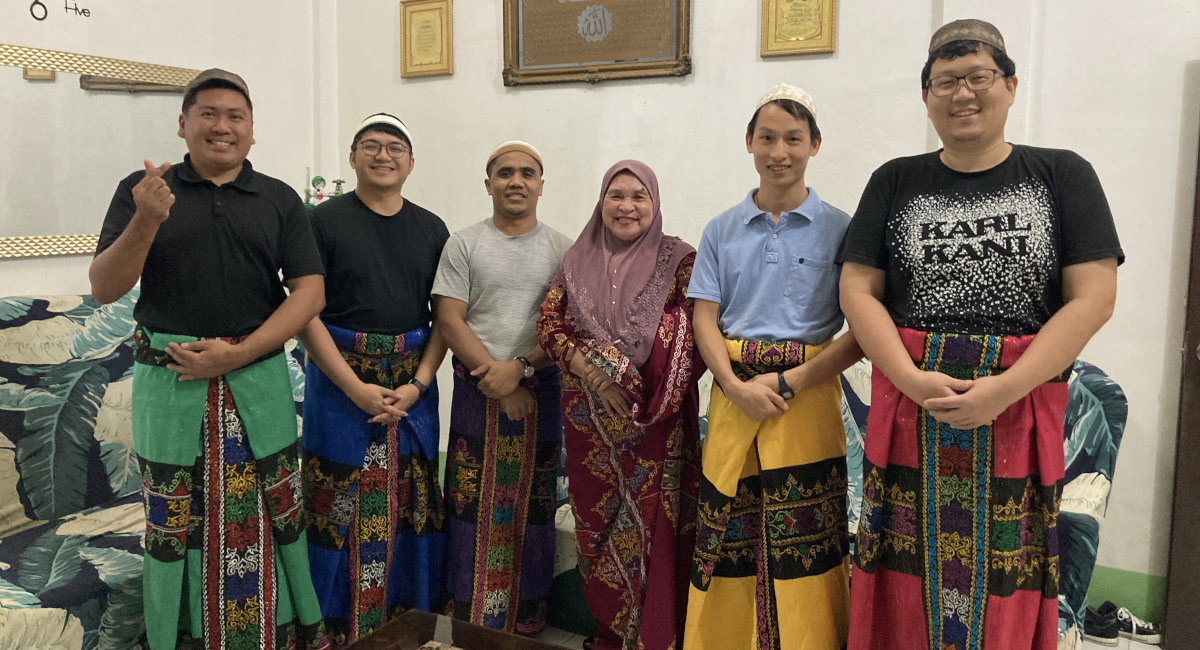
A building bombed during the Marawi siege – a stark reminder of the violence and devastation that befell the city.
Dialogue must begin with the heart, encompassing more than just the interplay between faith and reason. It does not start with theological exchange, but ideally with genuine human encounters, where individuals share how they live their faith at home, in their community, and in the marketplace. In this context, the Asia Pacific Theological Encounter Programme (APTEP) achieves its purpose of helping young Jesuit scholastics foster an understanding of Islam not through formal studies alone but through profound human encounters with the lived experiences of ordinary Muslims. This was an experience valued dearly by 10 Jesuit scholastics from Arrupe International Residence, who embraced life with Muslims in the Islamic City of Marawi for an entire week in August of last year.
The scholastics arrived in Marawi five years after the five-month battle between the Philippine military and militants aligned with the Islamic State of Iraq and Syria (ISIS). Their reflection papers, however, did not highlight the siege; instead they focused on the personal narratives of their Muslim hosts. Their newfound Muslim friends shared their stories of faith, where empathy, humility, generosity, and gratitude to God were lived daily. Religious differences blurred as the shared experience of God transcended individual beliefs.
Ignatian discernment involves mindfulness of the movements of the heart, including one’s feelings, emotions, and affections. It is through this emotional reciprocity that the scholastics formed a spiritual bond with Muslims. In fact, some of the scholastics were invited to participate in salat in Masjids (mosques). Their Muslim friends generously provided them Maranao clothes and caps so they could assimilate with the community. It was the first time for the scholastics to witness first-hand the prayers and recitation of the Qur’an in Arabic by their Muslim companions.
Bernard Lonergan SJ offers a framework in which commitment to a community naturally arises through love. To arrive at such commitment, one must immerse in the life of the community, leading to a deeper understanding, and subsequently, an insightful realisation. For those who practise Ignatian Spirituality, it is during the examen that insights, guided by the Holy Spirit, become tangible and perceived from God’s perspective.
One approach used to teach Islam to the scholastics involves adapting familiar theological concepts as starting points, such as the Annunciation and the Immaculate Conception, to facilitate the study of Islam. These theological connections are rooted in both the Qur’an and the Gospels. The two sources mention biblical figures including Jesus, Mary, Elizabeth, Zechariah, John the Baptist, and the Spirit who was present in the annunciation, which corresponds to the “virgin birth” in Islam. Additionally, the key figures from the Old Testament, such as Moses, Abraham, Joseph, Isaac, and Ishmael, are also mentioned in the Qur’an. Since these figures are depicted in both religious texts and are familiar to the scholastics, they can serve as an entry point for exploring Islamic Kalam (theology) and Islamic spirituality, as well as its original intent as a path to peace when it was first revealed to the Prophet Muhammad. Ignatian Spirituality shares similarities with Islamic spirituality. The discernment method of Ignatian Spirituality, which may have unexplored connections with Islam, has the potential to enrich Catholic spirituality.
The grace-filled experience of the Jesuit scholastics in Marawi left a lasting positive impression of Islam and its followers. The ongoing challenge lies in educating Catholics about the crucial role of Muslims in the mission of the Catholic Church. This understanding is shared by Popes, from St John Paul II and Pope Benedict XVI to the current Pope Francis. Personally, my own calling to contribute to strengthening the bond between Muslims and Christians has been rekindled by the positive outcome of the scholastics’ experience in Marawi. Growing up with a Muslim mother, a shared experience with Indonesian Jesuits and their extended Muslim families, I recognise the Holy Spirit as a constant presence guiding our work in APTEP to form Jesuit missionaries who can effectively live and work with Muslims in Asia and the Pacific.
Ignatius aspired to walk alongside Muslims, and thus we should pray that this becomes our desire as well. After all, like us, they also believe in the one true God, making Muslims are our closest kin. The Marian discourse that lies at the heart of the conversation between Ignatius and the Muslim provides a hint as to where to begin. The Qur’an affirms: “And thou wilt find the nearest of them in affection to those who believe (in God) those who say: We are Christians” (Q.5:82b). Certainly, this journey is not a leisurely stroll but a challenging ascent, yet every moment is worthwhile, for it is the guiding presence of the Spirit that leads the way.
This article is an extract of his article titled “APTEP in the Islamic City of Marawi” published in Vol 5, No 1 (2023) of the Asia Pacific Mission Studies, the journal of the East Asian Pastoral Institute.








